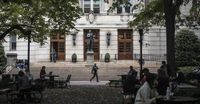The United States government recently took a dramatic step that could significantly impact the landscape of higher education, specifically targeting Columbia University. On March 15, 2025, Columbia received a letter described by many as the most dangerous correspondence in the history of American academia. The letter was direct and concerning, stating that Columbia must comply with a set of demands imposed by the Trump administration if it wishes to regain $400 million in scientific research funding, which was abruptly terminated on March 7, 2025.
In a manner resembling a ransom note, the government’s correspondence stipulated that Columbia must place its Middle Eastern, South Asian, and African Studies department (Mesaas) under “academic receivership” before negotiations could commence. This unprecedented demand raises alarm bells regarding governmental authority over university governance and academic freedom.
The Mesaas department, a small but vital part of Columbia's humanities offerings, focuses on the languages, cultures, and histories of these significant regions. How this department came to be the focus of such scrutiny is rooted in the faculty's academic independence, often questioning mainstream narratives regarding subjects such as the state of Israel and its relations in the Middle East.
Notably, the government's threats extend beyond mere funding issues. Columbia has been informed that by March 20, 2025, it must specify how it plans to enforce the receivership over Mesaas. The letter also hinted at broader consequences for the university's governance should it fail to comply. This intervention is seen as a hostile takeover of academic control, a move which some experts argue is akin to political censorship.
This intervention isn't happening in a vacuum; it echoes back to pivotal moments in American history when academic freedom faced significant threats, such as during the Red Scare of the 1950s. The rise of the American research university, heavily reliant on principles of academic freedom established in the early 20th century, now finds itself embroiled in potential changes that could restrict this vital tenet. The initial establishment of academic freedom was catalyzed by the 1900 dismissal of Stanford professor Edward Ross, a landmark event that highlighted the importance of an independent and unencumbered academy, a principle that kept thriving until now.
Columbia's situation became critical when the U.S. government's General Services Administration, alongside other federal entities, claimed Columbia had failed to adequately protect its student body from what they termed “antisemitic violence and harassment.” This accusation has not just put the university's funding at risk but has also raised questions about federal overreach concerning educational institutions. The current techniques being employed indicate a willingness to impose political ideologies upon the academic agenda.
As faculty members from various disciplines express concern, the challenges faced by Columbia extend far beyond its campus. If the government proceeds with actions reminiscent of a mobster's threats, insisting that the university manipulate or govern academic scholarship and political discourse at its will, it could set a dangerous precedent. Future federal actions may dictate not just funding but the very core of academic inquiry. This situation could potentially stifle dissent and creativity, which have traditionally flourished in American universities.
The fact remains that universities are meant to explore complex issues, including those related to international relations, through uninhibited discussion, debate, and scholarship. Many faculty members from Mesaas have notably avoided direct involvement in student protests, a point lost in the public narrative that has emerged from recent events. Yet, they have still been subjected to scrutiny due to their academic work, which encourages rigorous examination of sensitive issues.
Experts argue that the attempts by the government to control academic departments may violate both federal laws and constitutional protections related to free speech and the self-governance of universities. Sheldon Pollock, a prominent scholar at Columbia and former chair of the Mesaas department, emphasized that this unparalleled government intervention could devastate institutional integrity (Pollock was previously noted for his contributions to South Asian studies at Columbia.) “The right of academic departments to self-govern and the freedom of faculty members to express their views without fear are now at risk,” he stated, highlighting the broader implications of this governmental action.
Columbia now stands at a crossroads: should it acquiesce to these demands, it may set a dangerous precedent that compromises the university's integrity and, by extension, the integrity of academic institutions nationwide. If Columbia resists, it may open the door to lengthy legal battles that could occupy significant resources while raising additional questions about the government's authority in educational matters. It is clear that this dispute raises a critical issue of trust between academia and government, one that needs urgent attention from both legal and educational perspectives.
As March 20 approaches, the academic community watches closely, understanding that Columbia's response may not just influence its own future but establish a framework for how American universities interact with current political powers. They face not just a test of administrative management but a battle over the principles of governance, freedom of thought, and the preservation of scholarly independence. Will Columbia decide to stand firm for its values and the values of academic freedom? Or will it engage in a strategic retreat that will inevitably resonate through the halls of higher education?
Columbia’s leaders are urged to remember that the path of capitulation leads to the erosion of academic integrity. As Pollock rightly concludes, “If the Columbia administration capitulates, it will mark the beginning of its own destruction and that of the American university as such.” Thus, every stakeholder in American higher education—parents, students, faculty, and civic minded individuals—should advocate for the preservation of free speech, independent thought, and the untrammeled pursuit of knowledge. Failure to do so could herald a new era of systematic control over academics, one that must be actively challenged.


